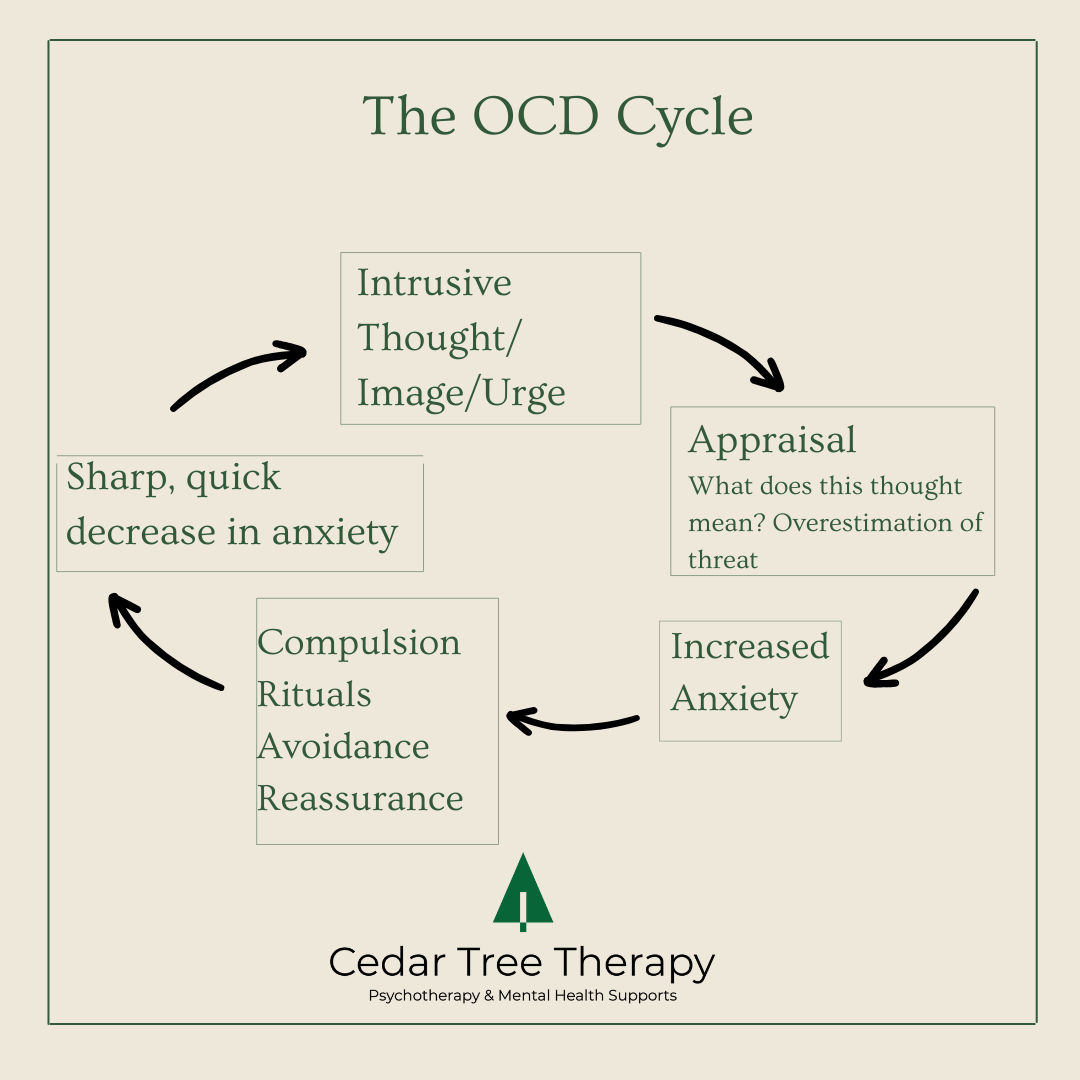In our practice, we often meet people who’ve been carrying a secret fear for a long time, one they rarely speak aloud. It usually begins with a question:
“Why would I think something like that?”
Maybe you’ve had a sudden image flash through your mind. Maybe something violent, inappropriate, or completely unlike you. Or maybe a disturbing question loops through your thoughts all day, no matter how hard you try to stop it. These aren’t signs you’re broken. They’re called intrusive thoughts, and they’re more common, and more treatable than most people realize.
This post explores what intrusive thoughts are, why they happen, how they show up in real life, and how Cedar Tree Therapy helps clients regain peace of mind.
What Are Intrusive Thoughts?
Intrusive thoughts are unwanted mental events: images, ideas, impulses, or doubts that feel jarring and uncomfortable. They show up suddenly, often at the worst times, and tend to focus on taboo or fear-inducing themes. What makes them especially upsetting is that they seem to contradict your values or identity.
Examples Include:
“What if I swerve my car into traffic?”
“What if I touched something toxic and didn’t realize it?”
“What if I accidentally harmed someone?”
“Do I really love my partner, or is something wrong with me?”
“What if I’m secretly a bad person?”
These thoughts can feel so out-of-place and intense that people begin questioning their character, morality, or mental stability.
Important Note: Everyone has random thoughts, but for people with OCD or anxiety disorders, these thoughts become distressing obsessions. The brain reacts as though the thought itself is a threat.
Why Are Intrusive Thoughts So Disturbing?
Let’s be clear: intrusive thoughts don’t feel random. They feel dangerous, personal, and urgent. This is where the obsessive-compulsive cycle can take hold.
How It Typically Plays Out:
An intrusive thought occurs: “What if I just screamed in this quiet room?”
You feel anxiety, guilt, or shame: “What’s wrong with me?”
You try to make the thought go away: by checking, avoiding, praying, confessing, or mentally analyzing, engaging in compulsions
Temporary relief … until the thought returns
This pattern is exhausting and can make a person feel like they’re constantly at war with their own mind. The real problem isn’t the thought itself, it’s the meaning the brain assigns to it and the desperate effort to make it go away.
Common Themes of Intrusive Thoughts
At Cedar Tree Therapy, we help people work through all kinds of intrusive thought content. While no two experiences are exactly alike, here are some of the most common themes:
1. Harm OCD
Fears about accidentally or intentionally harming someone
E.g., “What if I dropped my baby?” or “What if I stabbed someone?”
2. Sexual Intrusive Thoughts
Disturbing sexual images or fears related to taboo topics
These thoughts are particularly shame-inducing but don’t reflect desires
3. Religious or Moral OCD (Scrupulosity)
Obsessions about sinning, being impure, or violating moral rules
4. Contamination OCD
Fears of germs, illness, or spreading harm through touch or presence
5. Relationship OCD (ROCD)
Endless doubt about whether you're in the "right" relationship
6. Existential OCD
Obsessive questioning about life, reality, consciousness, or death
Why Do Intrusive Thoughts Happen?
Intrusive thoughts are a byproduct of a high-functioning, threat-sensitive brain. The human brain constantly scans for danger and sometimes, especially in people with OCD or high anxiety, it over-fires.
For example: A parent with strong moral values imagines harming their child and feels horrified. Their anxiety goes up, and their brain mistakenly assumes the thought itself is dangerous.
Result: They avoid being alone with the child, seek reassurance, or mentally review every interaction—just to feel safe.
This reinforces the idea that the thought was dangerous and should be avoided, thus keeping the cycle going.
The Role of Shame
One of the most painful aspects of intrusive thoughts is the isolation they cause. People don’t talk about them, not even with close friends or partners because they’re afraid they’ll be misunderstood.
At Cedar Tree Therapy, we emphasize this truth with our clients:
Intrusive thoughts show you your values—not your desires.
OCD loves to latch onto the things that you value the most. Of course you would want to protect what you value and experience fear, anxiety and distress if those things are threatened by your thoughts. You’re not broken. You’re someone with a brain that’s reacting to stress or trauma.
What Helps: How We Treat Intrusive Thoughts
1. ERP (Exposure and Response Prevention)
ERP is the gold-standard treatment for OCD and intrusive thoughts. In ERP, you practice allowing the thoughts to exist without doing the usual rituals (checking, avoiding, seeking reassurance). ERP is highly structured, and at Cedar Tree Therapy, we deliver it gently, with your full collaboration and consent.
2. Mindfulness and Acceptance-Based Approaches
Mindfulness helps you observe thoughts like passing weather, not personal attacks. Instead of “fixing” every thought, you practice saying:
“There’s that thought again. I don’t have to do anything about it.”
This takes practice, but over time it builds cognitive flexibility—the ability to stay grounded, even when the mind gets loud.
3. Trauma-Informed Care
For clients with past trauma, intrusive thoughts can carry an even heavier emotional load. Our therapists are trained to spot trauma-related patterns and work at a pace that feels safe, respectful, and empowering.
4. Self-Compassion Work
Shame feeds the OCD cycle. Self-compassion helps unwind it. You’ll learn to talk to yourself the way you would talk to a friend in the same situation.
How to Talk About Intrusive Thoughts (Without Fueling Them)
Talking about intrusive thoughts can help—but how you talk about them matters. If you’re constantly seeking reassurance from friends, partners, or Google, you might unintentionally be reinforcing the OCD cycle.
Instead, focus on:
Naming the thought (“This is an intrusive thought”)
Noticing the urge to check or neutralize
Practicing gentle redirection (“I'm choosing not to feed this loop today”)
Building a Safe Container for Healing
Therapy is about more than tools—it’s about relationship. At Cedar Tree Therapy, we don’t just give you coping strategies; we provide a safe, grounded space to explore what these thoughts mean to you, how they’ve impacted your life, and how you want to move forward.
We use a collaborative, non-pathologizing approach. You’ll never be rushed. You’ll never be shamed. You’ll always be treated as the expert on your own experience.
Frequently Asked Questions
Are intrusive thoughts normal?
Yes. Nearly everyone has intrusive thoughts. But for those with OCD or anxiety disorders, they become sticky and distressing.
Do intrusive thoughts mean I want to act on them?
No. In fact, the more distressed you are by a thought, the less likely you are to act on it.
Can therapy really help?
Absolutely. With proper support, clients can reduce the power of intrusive thoughts, develop a healthier relationship with their mind, and regain control of their lives.
Final Words
You are not your thoughts.
You are not alone.
And healing is possible.
If intrusive thoughts have been running your life, it might be time to take back the reins with support that feels steady, respectful, and rooted in understanding. Whether you’re looking for ERP, trauma-informed therapy, or simply someone who gets it, we’re here for you.




